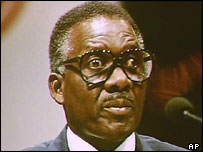
In 2006, the PLP renamed Nassau International Airport after Sir Lynden Pindling when Prime Minister Perry Christie was serving in his first term as leader of The Bahamas.
I believe the party was mimicking Barbados, which named Seawell Airport after Sir Grantley Adams in 1976, five years after his death. The airport facility in Nassau is presently undergoing a $400 million upgrade which has made it the envy of the region. The PLP government announced last year that a bronze statue of Pindling will be placed at the entrance of Lynden Pindling International Airport to commemorate The Bahamas’ 40th independence anniversary.
The government of Barbados had also erected a statue of Adams. It is located in front of the Cabinet office complex on Bay Street, St. Michael. About 13 or 14 years ago, a prominent businessman who supports the PLP named a housing subdivision his company built in New Providence after Sir Lynden. The subdivision is called Sir Lynden Pindling Estates Subdivision. It was the Free National Movement government which placed Pindling’s image on our $1 bill.
There are now talks of naming a major thoroughfare in Grand Bahama after Pindling. If these rumors are true, I think it would be a bad move by the PLP. Truth is, Pindling hardly accomplished anything worthwhile in Grand Bahama in the 25 years he led this country. His most notable achievement in Grand Bahama was his 1969 “Bend of Break” speech, which frightened away hundreds of expatriates and investors. That speech took away the magic from the Magic City. Freeport has never recovered from the economic fallout his speech caused.
Pindling was also leader when Jack Tarr closed is doors in West End, the most loyal PLP constituency in Grand Bahama. Seeing that South Androsians are so enthralled with Pindling’s name, why not name a street in that community after him? Even though South Andros never had paved roads when Pindling was its MP – and even though that community just got electricity in the mid-1980s – the people were willing to elect him as their MP for decades.
Historians are of the view that had it not been for Randol Fawkes, majority rule would have not been possible in 1967. Fawkes turned down many financial bribes from the UBP in order to support the PLP and Pindling. But despite his selflessness, he was kicked to the curb in 1968 after Pindling saw that he was no longer needed. PLP founders Bill Cartwright, Henry Taylor and Cyril Stevenson were all treated similarly by Pindling after he and a group of young ambitious black politicians took over the PLP in the 1950s. At the pinnacle of the PLP’s success, two of the original PLP founders were all but forgotten by the party they founded. Taylor lived in Florida between 1968 and 1978 and was appointed editor of the Hansard by the PLP government in 1979. He was appointed deputy and acting governor general on several occasions between 1981 and 1988. In 1991, he was appointed governor general after the retirement of Sir Gerald Cash. Taylor was at the ripe age of 89 when he was appointed, and was hardly in the physical condition to carry out his duties as governor general. Pundits believe that Pindling and the PLP only appointed Taylor to this position in order to soothe their guilty consciences for how they treated him.
Today, Pindling is considered the father of the nation. He is credited with introducing national insurance and establishing the defence force and ZNS TV. He also led the country to independence in 1973, even though he along with his PLP colleagues were opposed to the idea in the mid-1960s when the UBP government was considering it. He built many schools and is credited with establishing the black middle class. Pindling did some good things. But I believe PLPs are guilty of overrating him and his contributions to nation building.
Pindling cannot stand in the shoes of Sir Grantley Adams, the legendary Barbadian and West Indian statesman. Adams was never hauled before a commission to answer to allegations of corruption as was Pindling. Adams is a true national hero that all Barbadians can be proud of. Whether we want to admit it or not, non-Bahamians look at Pindling with jaundiced and suspicious eyes. Nowadays there seems to be a concerted attempt by PLPs to revise Pindling’s biography and to aggrandize his accomplishments. These people are working hard to erase from the memories of Bahamians his many shortcomings as prime minister. They don’t want us to remember the 1984 commission of inquiry. They don’t want us to remember that this country’s image was severely tarnished in the eyes of America while Pindling was prime minister. They don’t want us to remember that his government is alleged to have victimized many of his political opponents. They don’t want us to remember that he was an opponent of the press and free speech.
Many of his milestones are what one would expect a first government in a post-colonial era to accomplish. Even if Pindling had never existed, sooner or later the country would have achieved independence and majority rule. The PLP has made a mountain out of a molehill when it comes to majority rule and independence. Is Sir Lynden Pindling a national hero? Yes, but in the opinion of the whistleblower, he is an overrated one.
By: The Whistleblower


